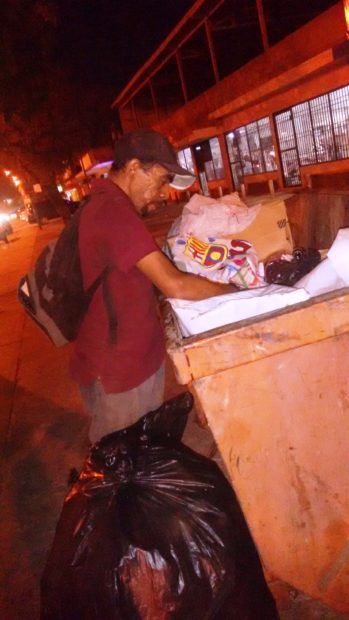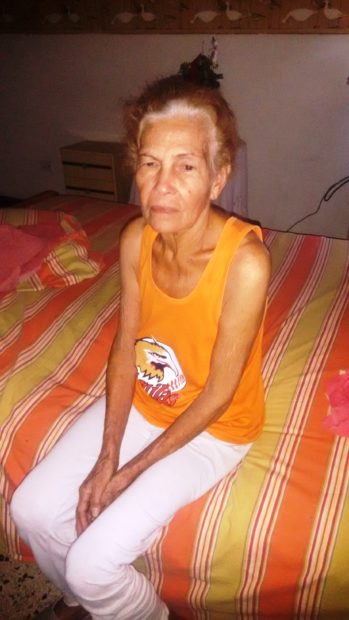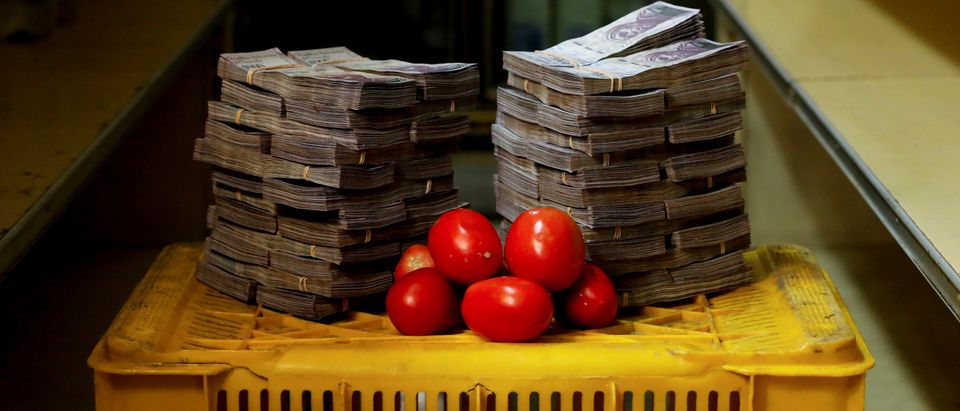Since the rise of Hugo Chavez and his socialist revolution, Venezuela stopped being one of the wealthiest democracies in the Western Hemisphere and transformed into a gigantic prison where millions of people live in the most inhumane conditions.
Inside the hermetic boundaries of this Caribbean nation, hunger is the main issue among the numerous tragedies that its citizens live through every day. In the middle of the highest inflation in the world, an atrocious murder epidemic and a chronic shortage of medicines, the picture that no one can’t overlook is the dark carnival of malnourished bodies walking on the streets and people looking for scraps of food in the trash.
Far from recognizing the problem, socialist tyrant Nicolás Maduro has doubled down on the socialist policies, exacerbating chaos to the point where the IMF recently predicted that the inflation would hit 1,000,000 percent this year.
Under the iron fist of this socialist revolution, the lack of food combined with a lack of hope consumes the lives of millions of people.
One of the stories that better exemplifies this unspeakable situation is that of José Gregorio, a 44-year-old man who lives in Caracas.
Gregorio was always poor, but hunger was never an issue in his crowded family. After experiencing the slow and progressive devastation of the Venezuelan economy, he suffered the transition of eating three meals a day to one.
Currently, in order to feed his wife and five-year-old daughter at least twice daily, Gregorio decided to dedicate nine hours per day to the chatarreo — a term some Venezuelans use to describe the action of looking for food scraps in the trash.
“I know you are probably disgusted by what I’m doing, but once you know what it feels like to eat a piece of bread every two days, you immediately change your way of thinking,” Gregorio said.
Far from being an easy start, the 44-year-old man explains how disturbing the first episodes of this horrible activity were.
“The first thing you notice once you open the black bag is the smell, because not even the strongest hunger will change how much that thing stinks. Another different thing is when you start to eat, because even when some food tastes awful, the sensation of finally getting something into your stomach makes you forget the flavors.”

José Gregorio, picture from Luis Orozco
According to José Gregorio, there are some important details about this activity that only those who are involved in it know about it. He explained that the most important one is essentially the way you defecate.
“If you ever want to get into the chatarreo, beware that your excrement will never be the same. The only way I have to describe it is as vomiting through your rectum. Your stomach will always feel really strange, and you always need to be ready to take a dump or getting your pants dirty.”
In addition, the 44-year-old man pointed out that some other essential elements in the life of a chatarreo are to know the city and be able to move consistently. After all, he said that just as robbing people, the golden treasure can only be found in the wealthiest areas.
“Most of the time, the food quality will depend on the location where you find the trash. That’s why avenues such as the Francisco Solano and Las Mercedes are the best because there are a lot of fancy restaurants.”
According to different studies, the vast majority of garbage scavengers are those who recently entered into the extreme poverty. While this class currently represents the 61.2 percent of the Venezuelan population, various analyses warned that the number could increase to 70 percent by the end of the year.
Regarding the different types of food he can find in the trash, Gregorio explained that it is always important to have different bags for the meat, the fruit, the rice, and the beans. Additionally, he said that when his wife and daughter join him in the chatarreo, they are the ones who look for the food waste on the trash while he protects them from “the competition.”
Despite the coldness with which Gregorio describes his situation, the 44-year-old man almost cried when he confessed feeling scared and desperate if the current state of his home country continues this way.
Gregorio then shared one horrible moment that he describes as the most shameful he has ever experienced:
I feel deeply depressed because I never thought I would be forced to eat from the trash and include my family in this hell. I think the most humiliating moment was fighting with a dog for a piece of chorizo. He bit me, and I kicked him. We were fighting in the middle of the street while some drug addicts were laughing watching us. Believe it or not, two little kids took advantage of that horror show to take the chorizo and the rest of the decent food that was on that bag.
Gregorio lives in Petare, which is known for being one of the most dangerous slums in Caracas and Venezuela. Incredibly, dozens of people are killed every single week in this part of the city. What’s even more astonishing is the fact that police refuse to go there because of the extreme risk it presents even for them. He shares a small house with his wife and daughter.
He says that every day, he makes his biggest effort to bring some food to the table, but there are days his child is the only one who eats.
While he has been a victim of the unspeakable violence in different opportunities, one horrible issue recently played in his favor: “My wife left me for a teenage drug dealer a couple of months ago. Fortunately, he got shot in the head, and now she’s back. I can’t say no to her because she’s the mother of my little girl, and I have to take care of both in any possible way.”
Just like Gregorio, over 80 percent of the Venezuelan population cannot eat three times a day. From the cold mountains of Mérida to the green landscapes of Apure, getting used to the hunger has been impossible for the Venezuelan population.
In the hot, oil-rich city of Maracaibo, another case that clearly displays the unspeakable hell that many are suffering in this country is the one of Marucha Madriz. Unlike José Gregorio, this 73-year-old woman was always part of the upper-middle class until the crisis destroyed her life.
Living in one of the wealthiest areas of Maracaibo, there are days Madriz can barely walk because of the hunger. Since the year 2016, she has lost 85 pounds and hope for a better future. According to her, if she manages to survive the years before Venezuela becomes a wealthy nation again, she will be too old to enjoy that moment.
“Everyone knows that the country will get better in a decade if things go well. I’ll be a very old lady at that time, and I highly doubt that my body will survive if it keeps losing weight. I always thought I would die naturally, but it seems that hunger will close my eyes and make me disappear sooner than later,” she said.

Marucha Madriz, picture by Luis O
In her beautiful house in La Coromoto Street, Madriz explains that she faints once per week because of the hunger. She also pointed out that while his son provides some food every time he can, he’s in a similar situation and has to care of his wife and children.
Every day, Madriz and her husband eat 20 grams of beans for breakfast and a tiny portion of yucca for dinner. For lunch, Madriz cooks what she describes as aguita salada, which is basically soup made of the few vegetables that are left over and a little bit of salt. She says she hates eating aguita salada for lunch because it is her favorite meal of the day.
“This has a logic and horrible explanation,” she said. “If you eat lunch, you can’t eat dinner. This only means that the time you’ll be starving will be way longer than recommended. You simply can’t imagine what is like to feel hunger for several hours and sleep with the same sensation. Desperation fills your eyes with tears because there’s nothing you can do to change reality.”
The downfall of her family started in 2014 when Madriz’s husband was fired from his job at one of the biggest companies in Maracaibo. While he couldn’t find another job, she was working as a teacher at an important school, providing everything that her family needed with her monthly income.
In 2015, that school went through a massive personnel cut and Madriz was fired. While they managed to survive with their pensions, inflation started to skyrocket, and their savings suddenly lost value. That year, they spent all of this money fixing their car’s engine.
In the year 2016, the real crisis began when Madriz’s husband went partially blind, and he couldn’t drive anymore. Since that moment, they’ve come to realize their incomes aren’t enough to maintain a normal lifestyle. In April, they had to sell the car to buy food for four months. By the end of the year, hunger became the common denominator in their lives.
“Right now, I don’t even have clothes of my size. I’m too skinny. Sometimes I see people looking for food wastes in the trash and I cry because I know that’s one of the few solutions I have left. I have too much pride to ask for food, but hunger is a hungry demon that radically changes your way of thinking.”
Over the last few months, her health has been severely damaged by the lack of protein. Madriz and her husband sold their wedding rings so she could pay for a proper specialist to check her. The doctor warned that severe malnutrition was killing her and prescribed some vitamins to counterbalance the lack of proteins.
Considering the high price of those vitamins, Madriz and her husband only ate aguita salada and a half portion of yucca two times a for a month. They needed to save as much as possible in order to buy the vitamins.
Once they finally bought it, things got worse than ever. Incredibly, while the vitamins managed to counterbalance the lack of proteins, it also exacerbated the appetite. Unfortunately, the doctor never said anything about this horrible side effect.
Currently, Madriz stays in bed most of the day to prevent the extreme dizziness that she feels when walking. According to her words, she thought that she and her husband could finally travel to Rome at this ag — a dream they had been planning for years.
“I only want this tragicomedy to end, I really don’t care about the outcome. I still want to live, but if I die, at least I won’t feel hungry anymore. I never felt so depressed. I never thought I would have to live this hell at my age.”
Since 2016, the strategy that Maduro executed to address the hunger issue was the creation of the infamous Carent de la Patria (CLAP). This one is a military-controlled network that sells boxes of food at low prices only to those who are registered on the Carnet de la Patria.
With this document, the socialist regime has full control of the people who have it. After all, Maduro can coerce these citizens to vote for him and participate in pro-government events by threatening to cut the distribution of the CLAP boxes.
Basically, the socialist tyrant saw the millions of Venezuelans desperate for food as a perfect opportunity to weaponize hunger and increase the society’s dependency on the state.
José Gregorio and Marucha are some of the millions of citizens who registered on the Carnet de la Patria to get some food. But it has been impossible for them to depend on these boxes considering that the regime distributes them only once every two months. In many opportunities, the products are even impossible to eat because they already passed the expiration date.
Despite the way some leftist politicians in the West conveniently ignore the Venezuelan situation, the malnourished bodies and desperate eyes of José Gregorio and Marucha clearly represent the inhuman nature of socialism.
A political ideology that creates gulags, builds genocidal tyrannies and starves millions of innocent people to death.
A political system that even in its democratic form can turn a wealthy nation into the most impoverished Orwellian nightmare.
Luis Orozco is a Venezuelan writer and journalist. He has been published in different Venezuelan and U.S. outlets.
The views and opinions expressed in this commentary are those of the author and do not reflect the official position of The Daily Caller.


